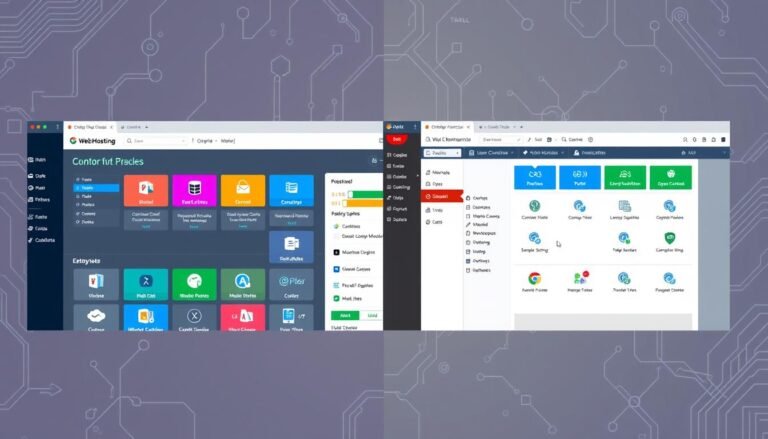Domain Hosting vs. Web Hosting: What’s the Difference in 2024?
Navigating the intricacies of website creation can often feel daunting, particularly when it comes to grasping the distinct roles of domain hosting and web hosting. As 2024 approaches, possessing a clear understanding of the key differences between these two essential services becomes imperative for anyone aspiring to build a robust online presence and enhance their website performance.
This article elucidates what each service entails, the reasons both are necessary, and the manner in which they synergize to facilitate a successful website launch. Readers can anticipate gaining both clarity and confidence as they embark on their web journey, including managing website files and understanding DNS settings.
Key Takeaways:
1. Domain hosting and web hosting are two distinct services that are essential for setting up a website in 2024.
2. Domain hosting allows you to register and manage your website’s domain name, also known as a website address, while web hosting provides the servers and technology to store and display your website’s content, including website files.
3. Having both domain and web hosting is crucial for a successful website, as they serve different purposes and work together to make your website accessible to the world.
Understanding Domain Names and Web Hosting
Grasping the intricacies of domain names and web hosting is essential for establishing a successful online presence. A domain name, often referred to as a website address, facilitates easy access for users seeking content and is managed through domain registrars.
Conversely, web hosting refers to the service that allocates server resources for storing website files on a web server, ensuring their availability to users across the internet. These elements collectively constitute the bedrock of a website’s infrastructure, influencing everything from hosting speed to overall user experience.
Thus, selecting an appropriate hosting provider and adeptly managing DNS settings become imperative for optimal performance, ensuring efficient website management and online visibility.
Key Differences Between Domain Names and Web Hosting
The fundamental distinctions between domain names and web hosting reside in their respective functions and services, each contributing uniquely to the establishment of a website’s identity and infrastructure.
A domain name serves as the website’s identity, offering a user-friendly address that guides visitors to their desired destination. In contrast, web hosting refers to the service responsible for storing and delivering the website’s files across the internet, crucial for maintaining website accessibility.
Grasping these differences is crucial for effective domain ownership and website management, ensuring a robust online presence that is both visible and operational.
The Importance of Choosing the Right Domain Name
Choosing the right domain name is crucial for establishing a robust online presence and crafting a memorable website identity. The domain name serves as a reflection of the brand, enabling users to connect seamlessly with the content. Given its significance, domain registration emerges as a pivotal step in the website development journey. A thoughtfully selected domain with an appropriate domain extension can enhance a site’s visibility and credibility, ultimately driving traffic and fostering user engagement.
In the process of selecting a domain name, one should consider factors such as length, simplicity, and relevance to the business. The goal is to opt for a name that is not only easy to spell but also memorable, facilitating effective word-of-mouth marketing and encouraging return visits. Additionally, ensuring domain privacy is important to protect ownership details.
Incorporating relevant keywords can serve to bolster SEO efforts, aiding in improved search engine rankings. It is essential that the domain conveys the essence of the brand, as it stands as the cornerstone of the digital identity, and is verified through domain lookup tools.
Once a name has been chosen, it is imperative to verify its availability and secure ownership promptly, often through domain registrars. This proactive approach ensures that others cannot claim it, thereby safeguarding the integrity of the online presence.
The Role of Web Hosting in Website Performance

Web hosting plays an essential role in determining a website’s performance, directly influencing both loading speed and user experience. Selecting the appropriate hosting provider can greatly enhance a website’s loading times, reliability, and overall functionality. A high-quality web hosting account ensures that the site remains accessible to users while effectively managing varying traffic levels, making it crucial for a seamless browsing experience. Hosting plans should be evaluated for their website storage and website security capabilities.
In the realm of hosting services, it is vital to understand the different types available: shared, dedicated, cloud hosting, and VPS hosting.
- Shared hosting, often budget-friendly, is ideal for beginners or smaller projects. However, it may result in slower performance during peak traffic times due to resource sharing.
- Dedicated hosting grants exclusive access to server resources, significantly enhancing speed and reliability—an essential factor for high-traffic websites.
- Cloud hosting offers unparalleled flexibility and scalability, adeptly accommodating sudden increases in visitors without compromising performance.
Each hosting type carries distinct implications for website performance, underscoring the importance of assessing specific needs and anticipated growth when choosing a hosting provider.
Domain Registration and Management Essentials
Domain registration represents a foundational step in establishing a website, securing domain ownership while laying the groundwork for effective domain management. Proper DNS settings are critical for linking the domain name to the web hosting provider, ensuring that users can effortlessly access the site, which is essential for website accessibility.
A thorough understanding of domain transfer processes is vital for maintaining ownership and managing the domain effectively, ultimately enhancing the site’s accessibility and online visibility. Familiarity with the domain market can provide insights into current trends and valuations.
Navigating these aspects not only prevents potential downtime but also fortifies the brand’s credibility within the digital landscape. When a website is easily accessible, it significantly enhances the user experience, and efficient DNS management plays a crucial role in achieving that objective.
Furthermore, regularly reviewing domain settings and staying updated with transfer protocols simplifies the process of shifting registrars or consolidating multiple domains. By prioritizing these elements, website owners can cultivate a robust online presence that attracts and retains visitors.
Choosing the Right Hosting Provider
Selecting the appropriate hosting provider is a crucial decision that profoundly impacts a website’s performance, stability, and user experience. With a plethora of web hosting services at one’s disposal, comprehending the various hosting packages and their features becomes essential. Hosting comparison is a helpful tool in evaluating different options.
Key considerations such as the cost of hosting, the quality of customer support, and the scalability of hosting solutions warrant meticulous evaluation. This careful assessment ensures that the website can evolve in tandem with the business’s needs, ultimately bolstering its online presence. Hosting companies like Bluehost, Hostinger, and GoDaddy offer a range of options to suit different requirements.
Types of Web Hosting Services
There exists a diverse array of web hosting services today, each tailored to meet varying needs and budgets. Shared hosting emerges as the ideal solution for small websites and blogs, celebrated for its cost-effectiveness. In contrast, dedicated hosting provides enhanced resources and control, making it a suitable choice for larger enterprises. Cloud hosting stands out for its scalability and reliability, making it an excellent fit for rapidly growing sites. Meanwhile, VPS hosting offers a balanced option, delivering dedicated resources within a shared environment to accommodate a variety of website requirements, including eCommerce platforms.
For those seeking an affordable and user-friendly solution, shared hosting enables multiple websites to share server resources; however, this can lead to slower load times during traffic surges. Conversely, dedicated hosting grants complete access to server resources, ensuring superior performance, albeit accompanied by a higher price tag and a need for more technical expertise, which is often required for managing a WordPress website.
VPS hosting finds a sweet spot, providing private server space at a moderate cost, ideal for individuals requiring additional power without the full commitment of dedicated services. Cloud hosting, with its pay-as-you-go model, shines in flexibility, adeptly adjusting to fluctuating traffic, though it may incur unexpected costs if not monitored diligently. Hosting packages from providers like Network Solutions also offer customizable options for varying needs.
By understanding these various options, users are given the power to select the web hosting service that best aligns with their specific needs, including considerations of website functionality and site migration options. For more information, check out Domain Hosting vs. Web Hosting: What’s the Difference in 2024?.
Evaluating Hosting Packages

When evaluating hosting packages, it is crucial to consider how various options will impact website performance and functionality. Key factors to examine include the allocation of server resources, uptime guarantees, and bandwidth limits. A comprehensive understanding of these elements enables individuals to select a web hosting service tailored to their specific needs, ensuring that the website operates smoothly and efficiently for users.
Assessing scalability options is equally important, as the chosen hosting solution should evolve in tandem with the website’s growth. This necessitates seeking web hosting services that offer flexibility in resource allocation, allowing for seamless upgrades without significant downtime, thus improving overall website performance.
Another vital aspect to scrutinize is the level of customer support provided, as timely assistance can significantly affect website performance and the overall user experience in the event of any issues. For more information on hosting options, check out Domain Hosting vs. Web Hosting: What’s the Difference in 2024?.
By considering these criteria, including hosting speed and server resources, one can make a well-informed decision, ensuring optimal website functionality and enhanced online presence for the long term.
Also Read: Top Features of cPanel vs. Plesk Hosting for Developers
Importance of Customer Support in Web Hosting Services
Customer support is an essential facet of any web hosting service, as it directly influences an individual’s ability to manage their website efficiently, including aspects like domain registration and domain management. Reliable technical assistance serves as a crucial resource for troubleshooting issues, guiding users through server management, and ensuring that the hosting provider addresses any complications with alacrity.
A hosting provider renowned for its exceptional customer support, such as Bluehost or Hostinger, can significantly enhance the maintenance of a seamless online presence.
The importance of quality customer support transcends immediate problem-solving; it cultivates long-term relationships that bolster overall website performance and website security. When issues are resolved promptly, downtime is minimized, guaranteeing that visitors enjoy a consistent and uninterrupted experience.
Empathetic support teams have the capacity to demystify complex tasks, empowering users to optimize their sites independently. Common challenges, such as server migrations or software updates, become far less intimidating with expert guidance, allowing individuals to concentrate on growth, content creation, and managing their website infrastructure.
Ultimately, prioritizing customer support in web hosting is a strategic decision that can lead to improved site management, enhanced website accessibility, and heightened satisfaction for both site owners and their audiences.
FAQs
What is the difference between domain hosting and web hosting services?
Domain hosting refers to the service of registering a domain name for your website, such as through domain registrars, while web hosting is the service of storing and managing all the website files and data that make up your website on a web server. In simpler terms, domain hosting is like the website address, while web hosting is the physical location where your website resides.
Do I need both domain hosting and web hosting for my online presence?
Yes, you will need both services to have a functioning website. Domain hosting allows users to access your website by typing in your unique domain name, while web hosting provides the server space, server resources, and tools to keep your website running smoothly, ensuring optimal website management.
Can I use the same hosting provider for both domain hosting and web hosting?
Yes, many web hosting companies, like GoDaddy or Network Solutions, offer domain hosting services as well. This can make it easier and more convenient to manage both aspects of your website in one place, enhancing your online visibility.
How much do domain hosting and web hosting packages cost?
The cost of both services can vary depending on your hosting provider and the features you choose. Generally, domain hosting is cheaper, often costing between $10 to $50 per year, while web hosting packages can range from $5 to $30 per month, depending on the hosting plans and the level of service required.
Do I need to buy a new domain name if I already have a web hosting account?
No, you do not need a new domain name if you already have a web hosting plan. You can simply connect your existing domain name to your web hosting account by updating your DNS settings, ensuring seamless integration with your website infrastructure.
Can I change my web hosting provider without affecting my domain name or website identity?
Yes, you can switch web hosting providers without changing your domain name. You will need to transfer your website files and data to the new hosting provider, ensuring that your website identity remains intact. However, if you switch domain hosting providers, your domain name will also be affected, necessitating a domain transfer.







